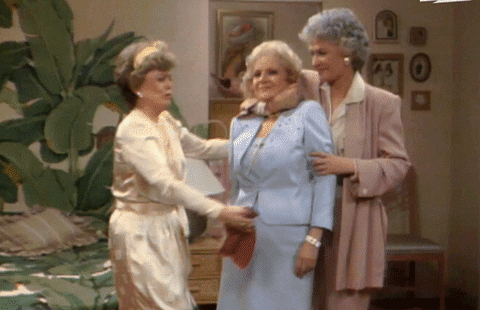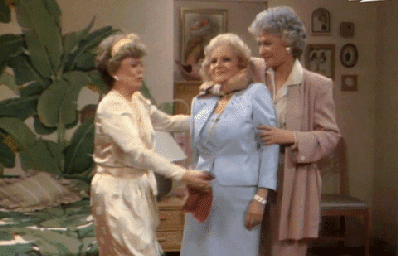The Golden Girls was one of those sitcoms I always associated with “the past.” I knew it existed and that those who loved it, loved it. I remember hearing that in Deadpool Ryan Reynolds paid an arm and a leg to wear a Bea Arthur shirt in the first movie. But I could never be bothered to watch it — not when there were so many other shows that more accurately described how I wanted my life to look. I wanted life to be like How I Met Your Mother, a long quest of self-growth, friendship and fun shenanigans that led to true love — set in New York City, the place to live like a young 20-year-old. Also set in NYC, I wanted life to be like Sex and the City. Independence, shopping, glamor and the aforementioned sex that — once again — led me to a suitably wealthy true love. Or, on occasion, I’d want to be in Supernatural, where traveling around killing monsters and saving the world more than made up for not being in “the big city” and the lack of any happy romantic ending. Then, earlier this year, everything changed. Betty White died. That didn’t motivate me to watch the show either; boredom did.
Boredom and a YouTube video from one of my favorite YouTubers, Culture Cruise, motivated me. In it, he explained why the show was so important to the LGBTQ community and how poignant it could be. So, I finally decided to give it a go, and he was right. In between the ’80s perms and wicker furniture, there was a show with a lot of heart. The girls were simultaneously role models and relatable. I wanted them to be my grandmothers and aunts but also wanted them to be my friends. Here were just a few of my favorite and most surprising finds.
- the entire episode of “not another monday”
-
As you would expect in a show about four women in retirement, there was a lot of death. Some of the girls had lost their husbands or their parents. In one episode, one of the main four loses a son. After seeing Sophia gleefully read the obituaries to see who she “outlasted” or when Blanch jubilantly announced her mother-in-law was dead, I thought I had seen everything. When it was discovered that sweet, innocent Rose Nylund killed not one but two men during sex, I thought, “They couldn’t top this,” but they did in “Not Another Monday.” In it, Sofia grapples with her morals when asked to sit with a friend as she is euthanized. Sofia goes back and forth, trying to balance her guilt and religious views with friendship and love. This is an episode that is especially poignant to anyone who has seen loved ones die or the struggle of having a loved one on life support.
- it dealt with lgbtq issues
-
If there is one thing you should know about Blanche Devreau, it’s that she loves men. She also loves love. So, men being in love with each other is nothing — except one less person susceptible to her seductions. That changes when she finds out her brother is gay. Her journey to acceptance takes several episodes and spans several seasons. Even when she takes one step forward, she falls back, like when she finds out her brother is engaged and wants to be married to his long-time partner. While I wish this arc was a bit more dated, even today people struggle with LGBTQ acceptance and biases. However, seeing her try to grow as a person gives me hope for others who are less accepting. Seeing her struggle to do it in the ’80s and ’90s reminds me that things are getting better.
- phil petrillo
-
While never seen, I love Phil Petrillo. He is Sophie’s only son, Dorthy’s brother and a proud wearer of women’s clothes. I will admit, at first, I was afraid to see where the jokes would go. There was a lot of “I remember him trying on my dress,” “you put him in Dorthy’s baby clothes,” and “yeah, he’s a baby, he won’t remember.” There are some problematic issues with his whole arc, and the fact he is never seen. However, what sets him apart from a lot of similar arcs is that he has a happy life. He is loved by his family and happily married to his loving wife — who knows and encourages his activities.
- the romantic relationships
-
In a lot of the shows I grew up watching, romantic relationships were of the utmost importance. Entire seasons could be dedicated to wooing another character — look at Ted from How I Met Your Mother. Breakups, makeups and even more breakups were common. This isn’t the case in The Golden Girls. All of these women lead their own lives, and none of them are looking to get married. Instead, they all have their own wants and needs — some of which they get fulfilled romantically and others they find in their friendships. All those typical “he wants me to give up my job or move with him” arcs are a nonissue. These girls know what they want, and they won’t give up their dreams and lives just for romantic fulfillment.
- it explores medicine and the female body
-
As someone with quite a lot of experience with medical issues, it was refreshing to see these women living their best lives in spite of arthritis, the flu or chronic health conditions. With plenty of humorous jokes about the body and how it changes later in life, an entire episode is dedicated to Blanche’s fears of resuming sexual activity after getting a pacemaker, and there is even one episode where a character is tested for AIDS. However, it doesn’t stop there. The Golden Girls handles medical issues that we normally wouldn’t see outside of overdramatized episodes on Grey’s Anatomy with that same sense of humor, understanding and comfort. We see Rose struggle after her dentist gropes her. A situation that no patient should be exposed to, yet it is one that is all too common even now. In Sick and Tired, a two-episode arc, Dorothy is sent from doctor to disbelieving doctor as she tries to find a diagnosis for her chronic fatigue. She gets told she’s old, that she’s depressed and that nothing is wrong with her. However, she keeps persisting, encouraged by her mother and the girls to keep seeking help. She refuses to let these doctors talk down to her because she is a woman. Until finally, she gets someone who listens to her, trusts that she knows her own body, officially diagnoses her with Chronic Fatigue Syndrome, and sets her on the road to recovery. Finally, encouraged by the girls and even one of her former doctor’s wives, she confronts the doctor that refused to take her seriously on account of her age and gender. This is another one of those instances where I wish the show was less relevant. However, even today, studies have shown that medical biases can greatly impact patients and the standard of care they receive.
This show is far from perfect. It falls into various tropes, has outdated and questionable stereotypes, and is far from diverse. However, when it sets out to explore an issue, it does. Everything from income insecurities to homelessness to safe sex has been talked about on the show. Proving to both the characters and viewers alike, you’re never too old to grow, especially not when you have friends at your side.


